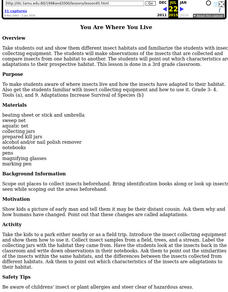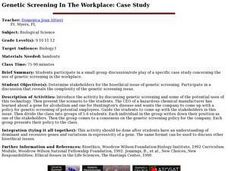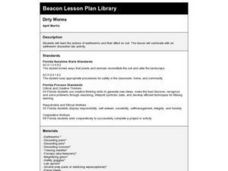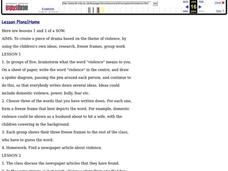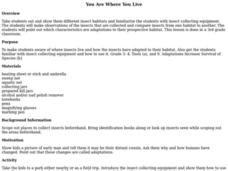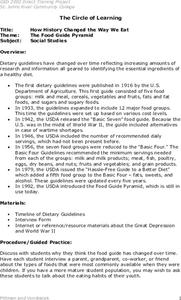Curated OER
Breaking News English: Drinking Wine Can Rot Your Teeth
In this English worksheet, students read "Drinking Wine Can Rot Your Teeth," and then respond to 1 essay, 47 fill in the blank, 7 short answer, 20 matching, and 10 true or false questions about the selection.
Curated OER
Breaking News English: Kate Moss Axed over Drug Scandal
For this English worksheet, students read "Kate Moss Axed over Drug Scandal," and then respond to 47 fill in the blank, 7 short answer, 20 matching, and 8 true or false questions about the selection.
Curated OER
The Secret Ballot - Voting in Australia
Students participate in classroom activities to develop an understanding of the secret ballot and the process of voting in Australia. Working in large and small groups they use the secret ballot and the various stages in an in-class...
Curated OER
Making Embryo Sets
Students preserve embryos to study embryonic development from day 3 through 21.
Curated OER
Bouncing Balls
Young scholars create a polymer to demonstrate its properties and develop an awareness of the wide variety of uses for polymers.
Curated OER
You Are Where You Live
Students explore where insects live and how they have adapted to their environment.
Curated OER
Student Led Staff Development: A Teen's Definition of Crisis
Students research an area that is relavent to their age level that concerns them. They work together to create a presentation to give to the faculty. They must use technology in their presentations.
Curated OER
Genetic Screening In The Workplace: Case Study
Students participate in a small group discussion/role play of a specific case study concerning the use of genetic screening in the workplace.
Curated OER
Dirty Worms
Students examine the functions of earthworms and their effect on soil. They conduct an earthworm dissection lab, and complete a checklist.
Curated OER
Violence
Students create a drama based on the theme 'violence'. Students then find newspaper articles that depict violence and share them with the class.
Curated OER
Heat Currents
Students using a slide made out of aluminum foil and pin holes observe visible light.
Curated OER
Slavery in Arkansas Workshop
Eighth graders explain the viewpoints of runaway slaves and the slave owners. They use stick figures to organize the escaped slaves according to their chances of actually remaining at large.
Curated OER
What Increases the Risk of Cardiovascular Disease?
Students analyze the risk factors for cardiovascular disease and classify them according to whether or not they are controllable. They discover how to reduce the probability of high blood pressure through diet and exercise.
Curated OER
Keith Haring: Art Representing Social Issues
Young scholars discuss Keith Haring posters that were created to represent different social issues. They, in groups, create a poster that represents a social issue that affects their lives.
Curated OER
Susan Brownell Anthony
Students learn what it was like for women in the United States prior to the time they could vote. They identify important facts and the contributions that Susan B. Anthony made to America.
Curated OER
Real Attractive
Sixth graders create a collage of attractive people. They write about what makes these people attractive. They discuss what makes someone attractive. They research eating disorders and how the media impacts what people deem as attractive.
Curated OER
Superbugs
Students research deep sea communities and discover strategies for combating antimicrobial resistance and write reports on it. They consider overprescription and prophylactic uses of antibiotics as causes for their ineffectiveness.
Curated OER
Advertisements
Learners access a variety of resources on the Internet regarding advertising and identifying intended messages conveyed through the media. They play interactive games, view video clips, read guidelines, and explore a student-created...
Curated OER
Pregnancy, Day 2
Young scholars listen to explanations of what can go wrong in pregnancy and why problems arise. They complete worksheets and define terminology.
Curated OER
Physical vs. Chemical Change Lab
Students recognize both a physical and chemical change in different substances. They determine which particles actually changed into different substances, and explain if it represented a physical or a chemical change.
Curated OER
You Are Where You Live
Third graders observe insects in a number of habitats. They recognize which insect characteristics are adaptations to their habitats.
Curated OER
How Can We Extract Human DNA?
Students perform an experiment in which they extract DNA samples from hair samples. They follow a set procedure to extract the DNA and complete summary questions.
Curated OER
What Is In The Cup?
High schoolers investigate the mixtures of solutions. They utilize cups filled with bases and acids. Students test and determine the pH of each cup. The multiple cups are compared to each other in order to chart acids and bases according...
Curated OER
How History Changed the Way We Eat
Students participate in a lesson that is concerned with the history of the food pyramid and how it evolved and changed into its modern state. After being presented with the information they conduct classroom discussions about the research.
Other popular searches
- Organic Chemistry Alcohols
- Naming Alcohols
- Combustion of Alcohols
- Alcohols Chemistry
- Alcohols and Esters
- Alcohols in Chemistry
- Alcohols Ethers
- Properties of Alcohols
- Alcohols and Phenols







